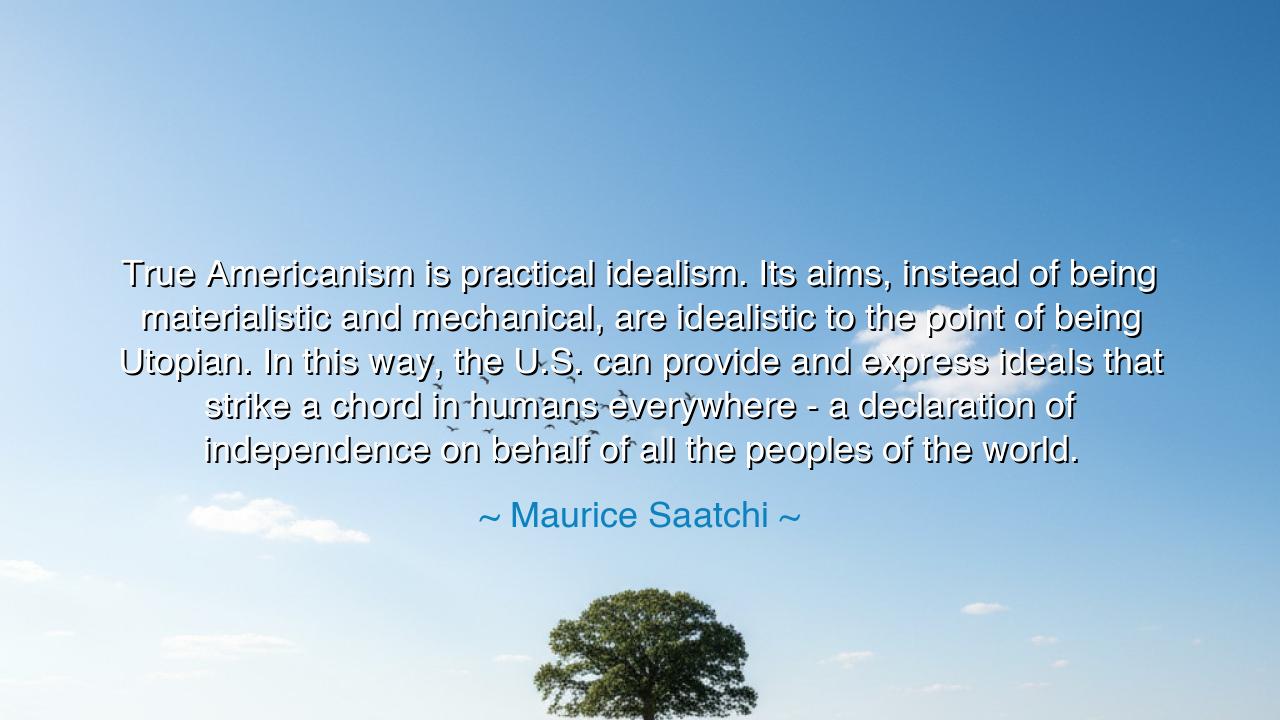
True Americanism is practical idealism. Its aims, instead of
True Americanism is practical idealism. Its aims, instead of being materialistic and mechanical, are idealistic to the point of being Utopian. In this way, the U.S. can provide and express ideals that strike a chord in humans everywhere - a declaration of independence on behalf of all the peoples of the world.






“True Americanism is practical idealism. Its aims, instead of being materialistic and mechanical, are idealistic to the point of being Utopian. In this way, the U.S. can provide and express ideals that strike a chord in humans everywhere — a declaration of independence on behalf of all the peoples of the world.” Thus spoke Maurice Saatchi, a thinker and businessman whose insight pierces beyond the borders of nations and reaches into the eternal soul of civilization. In this profound reflection, he reminds us that Americanism, at its truest, is not merely a national identity — it is a moral and spiritual posture. It is not conquest or wealth that defines a people, but their ideals — and in this case, idealism made practical, vision made real, dreams made action.
The origin of this quote rests in Saatchi’s meditations on the meaning of America’s global influence — not in its economic power or military might, but in its ideas. He saw that the founding vision of the United States was not confined to its soil; it was a light meant to guide all who yearned for liberty. When he spoke of a “declaration of independence on behalf of all the peoples of the world,” he evoked the spirit of 1776, when ordinary men, armed not with armies but with conviction, declared that human beings were born with rights beyond the reach of kings. In those words — “life, liberty, and the pursuit of happiness” — the world heard for the first time a new kind of revolution: one not of power, but of principle.
To call this “practical idealism” is to capture the paradox at the heart of America’s founding. It is idealism because it believes in perfection — in justice, equality, and freedom. But it is practical because it seeks to make those ideals tangible, to anchor them in laws, institutions, and human action. It is a philosophy that says the dream of freedom must not remain a dream; it must be built, defended, and lived. This, Saatchi argues, is what sets true Americanism apart — not the pursuit of riches or comfort, but the pursuit of ideals so lofty they seem almost Utopian, and yet so real they can move the hearts of millions.
Consider the story of Abraham Lincoln, who in the midst of civil war held fast to this same idealism made practical. When the nation tore itself apart over slavery, Lincoln did not simply seek victory — he sought renewal. His Emancipation Proclamation was not only a political act; it was a reaffirmation of the universal ideal that all men are created equal. In freeing the enslaved, he reminded the world that Americanism, properly understood, was not the privilege of one race or nation, but a principle for all mankind. It was, in Saatchi’s words, a “declaration of independence” that echoed across continents — the belief that freedom, wherever it arises, belongs to all.
Saatchi’s vision calls us to remember that materialism and mechanization, though they may bring comfort and power, cannot sustain the human spirit. A society that measures itself by profit and production alone may grow rich, but it grows hollow. True Americanism, he insists, must transcend this — it must be a faith in human potential, a moral duty to uplift rather than to dominate. It must wield its power not as a hammer, but as a torch — lighting the way for others to follow. In this sense, America’s greatness is not inherited; it must be chosen anew by every generation.
The Utopian ideal that Saatchi speaks of is not a fantasy of perfection, but an aspiration — a star by which a people may steer their course. No nation ever fully reaches its ideals; the point is to keep striving. As Martin Luther King Jr. declared, America’s founding documents were a “promissory note,” and the work of every generation is to cash it — to make liberty and justice real for all. In this, Saatchi’s words find their truest meaning: that idealism is not naive when it acts, and practicality is not cynicism when it dreams. The two must be joined, as heart and hand, for a civilization to flourish.
Let this, then, be the lesson carried forward: to live as a true idealist is not to escape the world, but to serve it. Independence — whether of a person or a people — is not selfish freedom, but responsible freedom: the courage to stand by one’s convictions, and the compassion to use that freedom for good. Each of us, in our own way, carries within us the power to make our ideals real — to act with honesty, to work for justice, to give without counting cost.
And so, as Maurice Saatchi teaches, let every generation renew the declaration of independence — not just for a nation, but for humanity. Let us strive toward a world where practical idealism guides our choices, where power serves principle, and where freedom is shared, not hoarded. For though nations rise and fall, ideals endure. They are the breath of the human soul, the compass of the ages — and when lived with courage, they can, indeed, strike a chord in every human heart.






AAdministratorAdministrator
Welcome, honored guests. Please leave a comment, we will respond soon